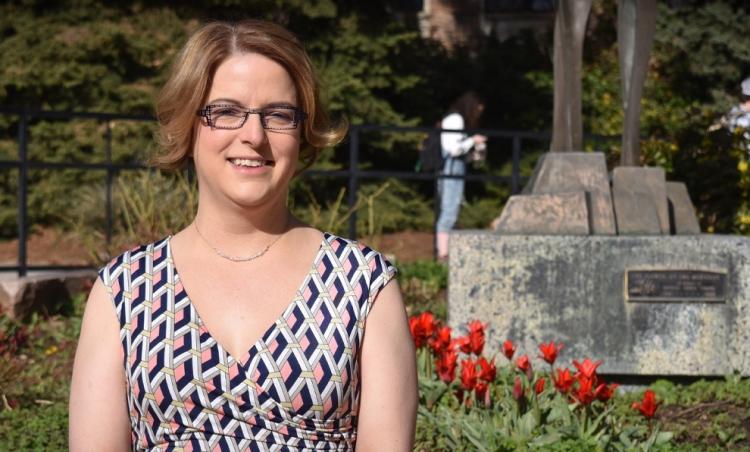Will abortion spur more women to vote in November? Expert weighs in
Banner image: Protesters gather outside the U.S. Supreme Court on July 4, 2022. Credit: CC photo by Victoria Pickering via Flick
The 2022 midterm elections are right around the corner, and a slew of high-profile races, including some in Colorado, remain nail-bitingly close. One question, in particular, has left many political pundits scratching their heads: How big of a role will the U.S. Supreme Court’s decision in June to strike down Roe v. Wade play in motivating voters to cast a ballot?
Michaele Ferguson is the author of the books Sharing Democracy and W Stands for Women: How the George W. Bush Presidency Shaped a New Politics of Gender and an associate professor in the Department of Political Science at CU Boulder who studies feminism and democratic theory.
Ferguson talks about Roe v. Wade and the Nov. 8 election, U.S. Rep. Lauren Boebert and gender in politics, and why senate candidate Joe O’Dea has staked out a moderate stance on abortion.

Michaele Ferguson
Do you think the Roe v. Wade decision has affected how people are viewing the upcoming election?
It made a difference for my students. The minute the opinion was leaked, I had students coming up to me after lecture asking me what the overturning of Roe v. Wade meant for their reproductive rights and for the country.
For decades, it's been hard to get my students to care about abortion as a live political issue, no matter how much I told them laws were going to change in their lifetime. I think that shock from seeing Roe v. Wade overturned is what's motivating a lot of younger women, in particular, to be more politically active right now.
Will that motivation make a difference at the polls?
During the primary election in Colorado we saw more women than usual go in person to vote. They weren't simply filling out mail-in ballots they already had at home. The fact that they were willing to do that in a primary where, at least on the Democratic side, there were very few competitive elections, suggests to me that they're highly motivated to make sure that their voices are heard this season.
What about nationally? Is that enthusiasm a good sign for Democrats?
I don't expect that we’re going to see a uniform pattern where, across the country, women of reproductive age will turn out to vote for Democrats. Equal numbers of women who are motivated on the abortion issue will vote for Republicans. And there will be other people who will say that abortion is a major issue for them, but who will trust the Republicans more on the economy. That’s the issue that voters are signaling that they care most about right now.
Colorado Republican Joe O’Dea, who is running to unseat Democratic Sen. Michael Bennet, has taken a more moderate stance on abortion than many other candidates from his party. Will that help him in November?
I think it's already helping him appeal to the more moderate Republicans in the state. Is that going to be enough to push him over the top and beat Bennet? I'm doubtful, but I think it's a really smart strategy. I think the Republican Party has to run a moderate in a purple state like Colorado.
In recent years, we’ve seen the rise of what seems like a new brand of women politicians—perhaps epitomized by Reps. Lauren Boebert and Marjorie Taylor Greene. What does their success tell us about the role gender plays in politics today?
There can be a stereotype that women politicians are kinder, gentler and more focused on issues like social welfare than men. But that's not true. We’ve also seen politicians like Margaret Thatcher in Britain who have really cut back the social welfare state.
I think of Lauren Boebert and Marjorie Taylor Greene as politicians in the mode of Sarah Palin. They’re appealing to a certain kind of voter on the right by being independent—Lauren Boebert wearing a gun and talking about gun rights evokes the way that Palin talked about herself as a ‘mama grizzly.’
That’s a particular model of female politician that I think we’re going to see a lot more of in the years to come.
With the midterms right around the corner, what are you telling your students?
One of the big lessons I try to impart in my students is that their voices and their votes matter. Whatever is going to happen in this election, it's not going to happen unless people actually turn out to vote.
There's something almost, to me, a little condescending about the self-assurance among Democrats that if they talk about abortion, it will turn out women to vote. It assumes that women are one-issue voters. I think there’s still a question about which party will be able to mobilize their voters to get them out the door and get their mail-in ballots in.
CU Boulder Today regularly publishes Q&As with our faculty members weighing in on news topics through the lens of their scholarly expertise and research/creative work. The responses here reflect the knowledge and interpretations of the expert and should not be considered the university position on the issue. All publication content is subject to edits for clarity, brevity and university style guidelines.


